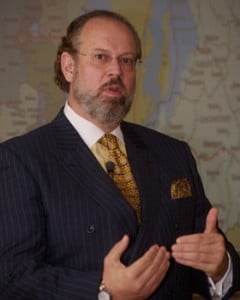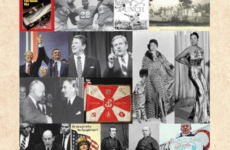By Kaitlyn Boisvert and Helen Stamas-
A procession of students, faculty, family, and friends gathered in Salve Regina University’s Lady of Mercy Chapel at noontime on Friday, September 7. The pervading atmosphere inside was serious and somber, as the chapel and its visitors commemorated the memory of Doctor Peter Liotta, a Salve professor that recently passed away. A memorial was held in Liotta’s honor; celebrating his life, personality, and accomplishments.
While the circumstance behind the occasion was no doubt tragic and heart-breaking, the attendees still managed to bring a bit of warmth and happiness to the gathering. Friends and family greeted each other, smiling, laughing, and shared favorite memories pertaining to the man of the hour. At times, it seemed almost like a natural, common gathering, one that was celebrating and cherishing togetherness, and not just lamenting a tragic loss.
This same theme of sadly mourning while happily reminiscing was relayed in the actual memorial service that took place. While a few heartfelt tears were shed, a lot of laughter took place as everyone remembered and reflected on the fascinating and accomplished man that was Doctor Liotta.
The memorial began with prayer and song, as everyone rose to stand and followed along to the assigned hymns and readings. Each of the teachings enabled the attendees to get more of a feel of the sense of unity and love present at the event, as well as encouraging them to live to appreciate the people who enrich and inspire them in their lives.
Following the procession of shared prayers and readings were commemorative speakers who came to the podium to speak about Liotta and how he had positively impacted their lives. First to present was Jaimee Doucette, a class of 2011 graduate of Salve Regina.
Doucette spoke with a quivering yet resonating voice, as she kept control of her emotions and relayed her experience with Doctor Liotta. During her education at Salve, Doucette had been a part of the school’s Pell Honors Program, and was majoring in Biology. A lot of her fellow Biology majors had dropped the program, yet Doucette had not followed suit, due to a certain professor who had greatly influenced her way of thinking, and changed the way she looked at the world. That professor was Doctor Liotta, whom she had for a course entitled “Rwandan Genocide”.
The class exposed Doucette to events and issues in the world she had previously been oblivious to. While the findings sometimes left her feeling angry and shocked, Liotta encouraged her to allow her emotions to show through her essays.
As a true poet at heart, Liotta believed in letting people reveal their emotions so their true voice could be released and full wisdom could be reached.“Dr. Liotta knew how to get through to us,” she said. “He wanted us to know what was happening and the truth behind humanity.”
Expanding further upon this notion, Mary Sokolowski next assumed the podium and spoke about how Liotta’s passion for empathy and wisdom truly impacted those around him. As an adjunct faculty member and a close colleague of Liotta, Sokolowski became familiar with Liotta’s teachings and grew to admire him for his passionate and kind spirit.
She reminisced how in his poetry, Liotta had always signed his works as “P.H. Liotta”, rather than “Peter Liotta”. This ploy was intentional, as he wished to leave it questionable on whether or not the author of his works was a man or woman.
According to Sokolowski, Liotta had acknowledged how fortunate he was to be a Caucasian male, and sought to stand up for others who were perhaps ostracized in society. Such a courteous act was indignant of Liotta’s compassionate and unique nature, and Sokolowski encouraged the people before her to remember and celebrate Liotta as an artistic man who found joy in surrounding himself with wisdom and love. “Remember Peter at his best-whether he was smiling, laughing or teaching,” she said. “Take that image, and keep it in your heart. Absorb it. And cherish it.”
The last person to speak on behalf of Doctor Liotta was none other than his own daughter, Gaia, whom had been a muse to many of Liotta’s writings. In honor of her father, Gaia stood at the podium without a tear in her eye, and spoke in a voice that expressed joy and happiness.
She expressed gratitude for all the attendees, thanking everyone for coming to the memorial and saying how blessed she felt to be standing before them. She voiced a speech that paid a loving tribute to her father, revealing her favorite memories and delving into their shared love for poetry. Poetry was something that she constantly drew back upon, as it was her father’s deepest passion and the medium which brought him the most happiness and fulfillment.
“Dad’s greatest lesson was that knowledge is love,” she said, beaming. “I will always remember him when he was in his true element-at poetry readings. The moment where he was truly happy.”
After the end of all the speeches, a few more hymns and prayers filled the church as a resolute and heart-felt way to say good-bye to Doctor Liotta, while simultaneously preserving his memory in all the hearts of those whose lives he had touched. When the memorial ended, a deep, respective silence ensued, as attendees slowly proceeded through the pews and towards the exit. Some had sorrowful tears lining their faces, while others smiled weakly.
Attendees had the chance to speak to both Gaia and her mother outside of the chapel. Every single person in attendance proceeded to do so, as a long single-file line coursed its way through the church and outside onto the entrance platform. Each person waited his or her turn to speak to the two most important women of Liotta’s life. The exchanges were full of pleasantries, laughter, and shared memories.
Soon, almost every face present had rediscovered happiness, as smiles were alight again. Attendees began to leave the chapel grounds, and walked out towards the neighboring path with the sun shining on their backs and planted blossoms lighting up their way.
Helen Stamas, a former student of Liotta’s poetry class, remembers Dr. Liotta with fondness, and had this to say on his impact as both a person and a professor-
“Letters cannot form the words I need to express the great pity I feel for those who have not been blessed with the opportunity I have had—and that is the opportunity of having known Dr. Liotta.
I write this not as an informative article, but rather something on a personal level. I write not only about Dr. Liotta as a professor, but as a person and the impact he has left on me as well as countless others.
I took Dr. Liotta’s Creative Writing: Poetry course during my 2011 fall semester of last year. In this class I grew as a listener as well as a writer. Some of what I feel is my best work has come out of that poetry class. I would leave Antone 221 every Tuesday and Thursday afternoon in a better mood prior to going in. Dr. Liotta had a personality and sense of humor that I could very easily relate to, and I would never hesitate to stop into his office to discuss something completely irrelevant to class—
Like Eliot’s The Wasteland—which seemed like his mantra, save Dante’s Divine Comedy of course.
I remember calling my Dad and sharing stories with him about Dr. Liotta and his dry sense of humor—the best kind there is.
It’s funny how one person can have such an impact on another without ever having met. After the first story I shared with my father about Dr. Liotta, he became a recurring topic in our succeeding phone calls.
I always considered telling Dr. Liotta about his being topic of discussion in phone calls with my Dad, however, I never ended up doing it. Isn’t there always a however? Now it’s one of those things where, in retrospect, I wish I had told him.
My Dad passed away unexpectedly this past June. I wrote a poem the night before his wake that I now consider one of my best pieces, probably because my Dad is the focal point of the poem. Still, my plan was to get back to Salve this fall and share my poem with Dr. Liotta.
I further planned to tell him about the stories I considered telling him before but had never gotten the chance to. The ones about the phone calls with my Dad, and how Dr. Liotta was admired by a man who he had never even met. I looked forward to taking his memoir class in which I am currently enrolled today.
I expected things to be far different from the reality that now exists.
‘Expectation is the root of all heartache,’ I’ve heard. There is no truer statement than this right now.
Still, though, I hope that knowing this about Dr. Liotta, and how he has touched my father without my father having known him—I hope this has at least touched anyone who did not have the chance that I had, to know such an admirable man, and that you, too, can admire him even without knowing him.”















